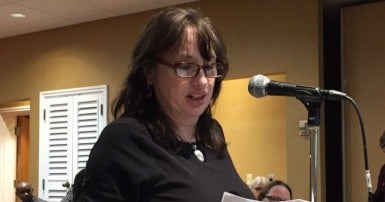
At the meeting, held in Ottawa on November 12, members of CUPE 2204 spoke about how their wages get caught between inadequate government funding and already expensive parent fees. CUPE 2204 represents 300 child care workers at 13 agencies in Eastern Ontario.
“Paid caregivers face a wage penalty due to the nature of the work we do,” said Janet Fredette, who works at Centretown Parents’ Cooperative Daycare in Ottawa.
“Caring for and instructing children is something that was traditionally done, and is still often done, predominantly by women without pay.”
In 2010, the average wage for early childhood educators and assistants in Ontario was $22,339. That’s about half the average $44,000 that cable television service and maintenance technicians earned in Ontario at the same time.
Jackie Dwyer, a child care worker with CUPE 2204, described how wage grants from the 1980s and 1990s are now being redistributed in Ottawa. The grants were designed to address low wages and help child care centres meet their pay equity requirements.
Now, the City of Ottawa is reallocating the grants to other low-wage workers, which may affect child care workers’ wages or even cause child care centre closures. This could have been avoided if wage grants had been rolled into base salaries.
A 2009-10 study found only 19 per cent of Ontario child care centres that responded had closed all wage gaps, under pay equity legislation.
“It’s difficult for non-profit employers to manage the extra one per cent of payroll burden to their budgets for proxy pay equity every year,” said Fredette.
Proxy pay equity is the process of calculating pay equity in predominantly female workplaces where there are no or very few male job classifications to compare to. In Ontario, the child care workforce is 97 per cent female.
Fredette called on the provincial government to create a dedicated pay equity fund for the broader public sector to help ensure workers’ right to equal pay could be achieved.
Learn more about the issues:

